
Download Modern Data Survey Report
Oops! Something went wrong while submitting the form.
Facilitated by The Modern Data Company in collaboration with the Modern Data 101 Community
Latest reads...
TABLE OF CONTENT
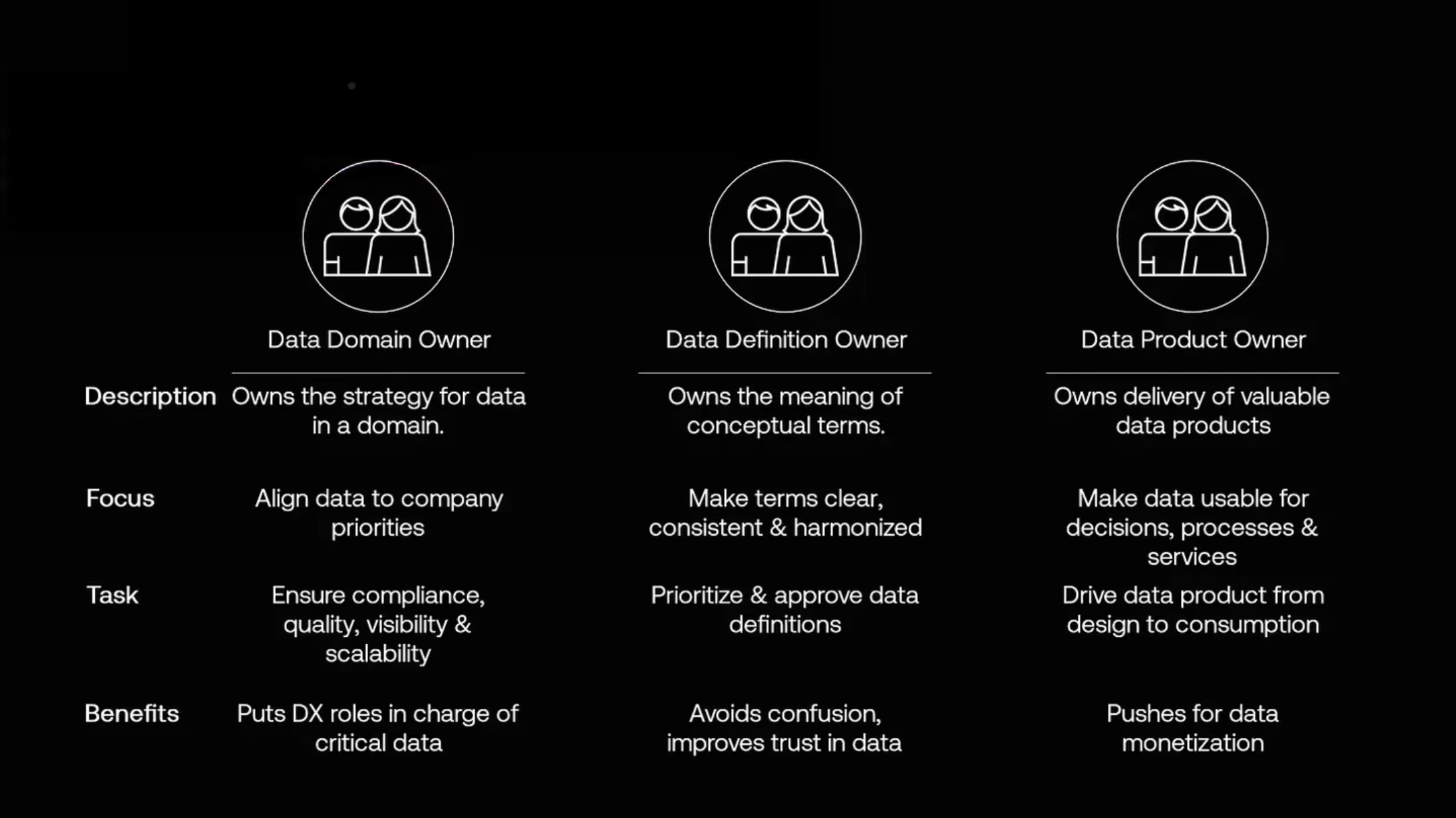

TOC
- Who’s a Data Product Owner(DPO)?
- 4 Pillars of Data Products and Why You Need a DPO to Own Them
- The Core Elements of a Successful Data Product and How a DPO Delivers Them
- Data Product Owner’s Role: Built on a Bi-Directional Collaboration
- The Strategic Value of a Data Product Owner
- What Makes a Great Data Product Owner? The Must-Have Skillset
- Final Note
Consider a sales team aiming to boost quarterly revenue, but the team relies on fragmented data, inconsistent reporting, and manual analysis. Trust is the first casualty when data quality and governance fall through the cracks. What follows is a cascade of reporting lags. Opportunity windows quietly close, and sales leaders fall back on instinct over insight. It’s not just inefficient; it’s fragile. Decisions made in the absence of reliable data are gambles, not strategies.
Now contrast this with a team grounded in discipline, whose decisions are backed by clean consolidated signals from across the business. Their analytics dashboard is beyond a tool and a reflection of a system that’s been thought through: governed, updated, and aligned.
Managers receive timely, actionable insights, enabling quick identification of under-performing regions, targeted customer segments, and effective sales strategies. As a result, the team achieves significant revenue growth and outpaces competitors.
The key differentiator? The Data Product Owner.
Before defining a DPO, let’s understand data products first.
A Data Product is an integrated and self-contained combination of data, metadata, semantics and templates. It includes access and logic-certified implementation for tackling specific data and analytics (D&A) scenarios and reuse. ~ Gartner
A Data Product Owner, positioned within specific business functions, bridges Data/AI teams and stakeholders, ensuring that data products deliver measurable value aligned with business needs.
Thought leaders in the domain consistently emphasise the need for data products to be consumer-focused and value-driven. The DPO manages the entire data product lifecycle, from defining vision and prioritising data product use cases to deploying and optimising products continuously and collaborating closely with technical teams to ensure alignment with strategic objectives and practical usability.
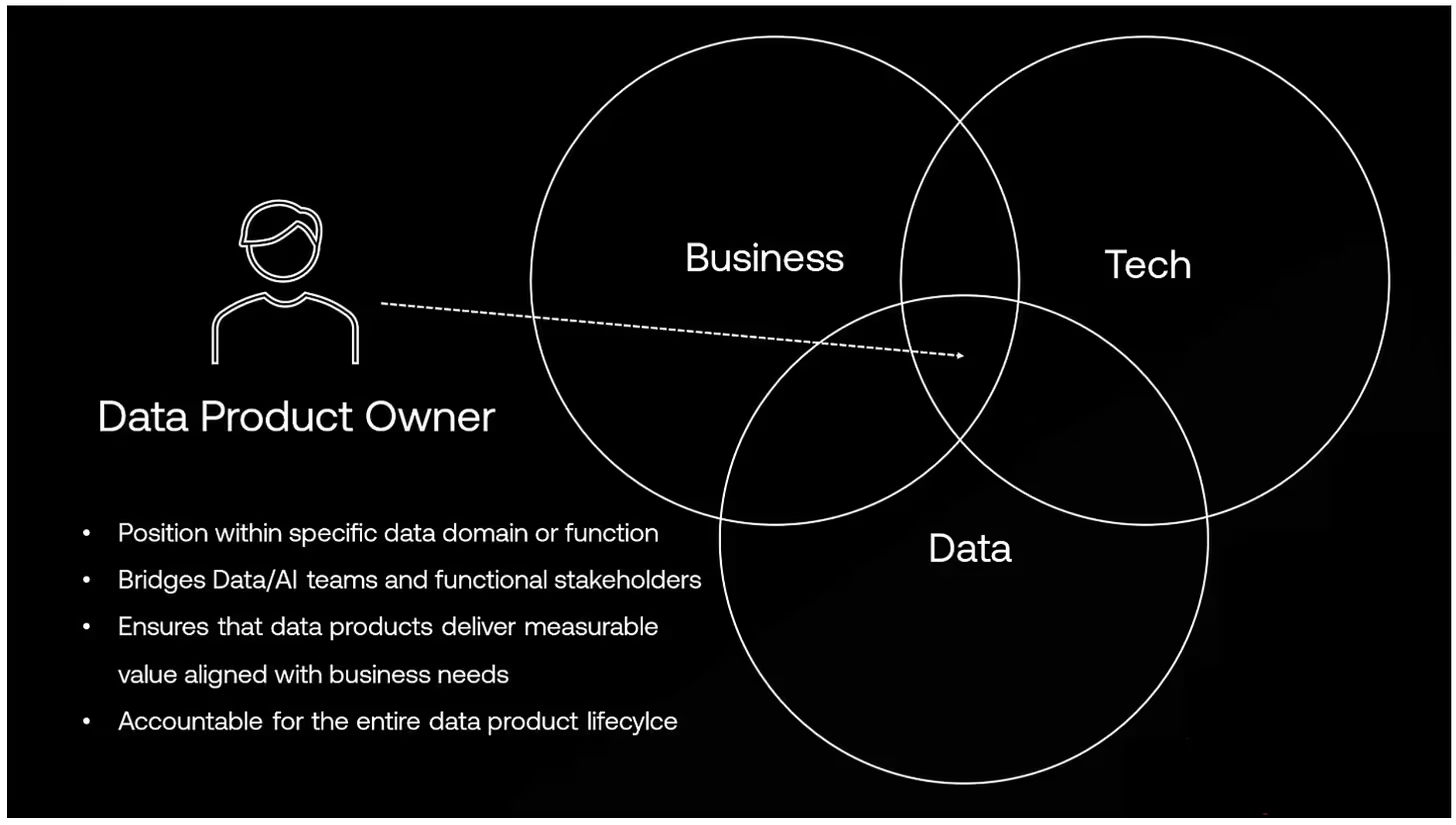
We must consider the responsibilities of the Data Product Owner across the four dimensions of a data product to understand this role's significance.
Adopting a product mindset, a DPO manages data products iteratively, using agile practices. They gather continuous feedback from stakeholders, like business managers and analysts, to guide enhancements. The goal? Evolve raw data into purpose-driven products that solve real problems.
A DPO anchors every data product to a clear business outcome. In the initial sales analytics scenario discussed, that means prioritizing features that directly impact revenue, like surfacing regional performance trends or spotlighting customer buying patterns. There are no dashboards for the sake of dashboards; but ones for driving better decisions, faster.
The DPO works closely with engineers and architects to ensure the platform runs like a well-oiled machine: scalable, reliable, and secure. They keep an eye on the current load and data product roadmap, providing the data foundation to support constantly changing business needs without compromising quality or uptime.
A DPO doesn’t stop at delivery, they make sure insights actually land. That means intuitive dashboards, clear visual storytelling, and solid documentation. They also roll out training and support so business users don’t just see the insights, but know exactly how to act on them.
A dataset doesn't automatically become a data product just because it's packaged neatly. To truly qualify, it must meet eight essential criteria, and a Data Product Owner (DPO) is the one who ensures it does.
Here’s how a skilled DPO brings each element to life in a sales analytics context discussed earlier:
A DPO defines clear, quantifiable outcomes tied to business goals, like increased conversion rates or improved regional performance, and continuously tracks these to ensure the product is delivering tangible value.
Comprehensive documentation, searchable metadata, and intuitive organization fall under a DPO's watch. They make sure the sales team can easily find and understand what's available, without needing a data scientist on speed dial.
A DPO ensures the product is built with modularity in mind. Whether it’s forecasting models or customer segmentation logic, components can be reused across different use cases and teams, avoiding duplication and driving consistency.
Through explicit metadata, user guides, and embedded context, the DPO makes sure the data product speaks for itself. Analysts and business users can interpret insights without hand-holding.
A DPO enforces data quality standards, aligns with regulatory requirements, and builds in auditability. That means users can trust what they see and know it's compliant by design.
Partnering with data producers and platform teams, the DPO ensures that access is role-based and appropriately restricted. Sensitive sales data stays protected without locking out legitimate users.
A DPO orchestrates CRM, ERP, and marketing platform integrations, enabling joined-up insights across functions. The goal? One view of the truth, not ten competing reports.
A DPO pushes for architectures that handle increasing data volumes, new analytics needs, and growing user demand. The product isn't just built for today, it's ready for what's next.
📝 Related Reads
Metrics-Focused Data Strategy with Model-First Data Products ↗️
The Data Product Strategy: Becoming Metrics-First ↗️
The Art of Discoverability and Reverse Engineering User Happiness ↗️
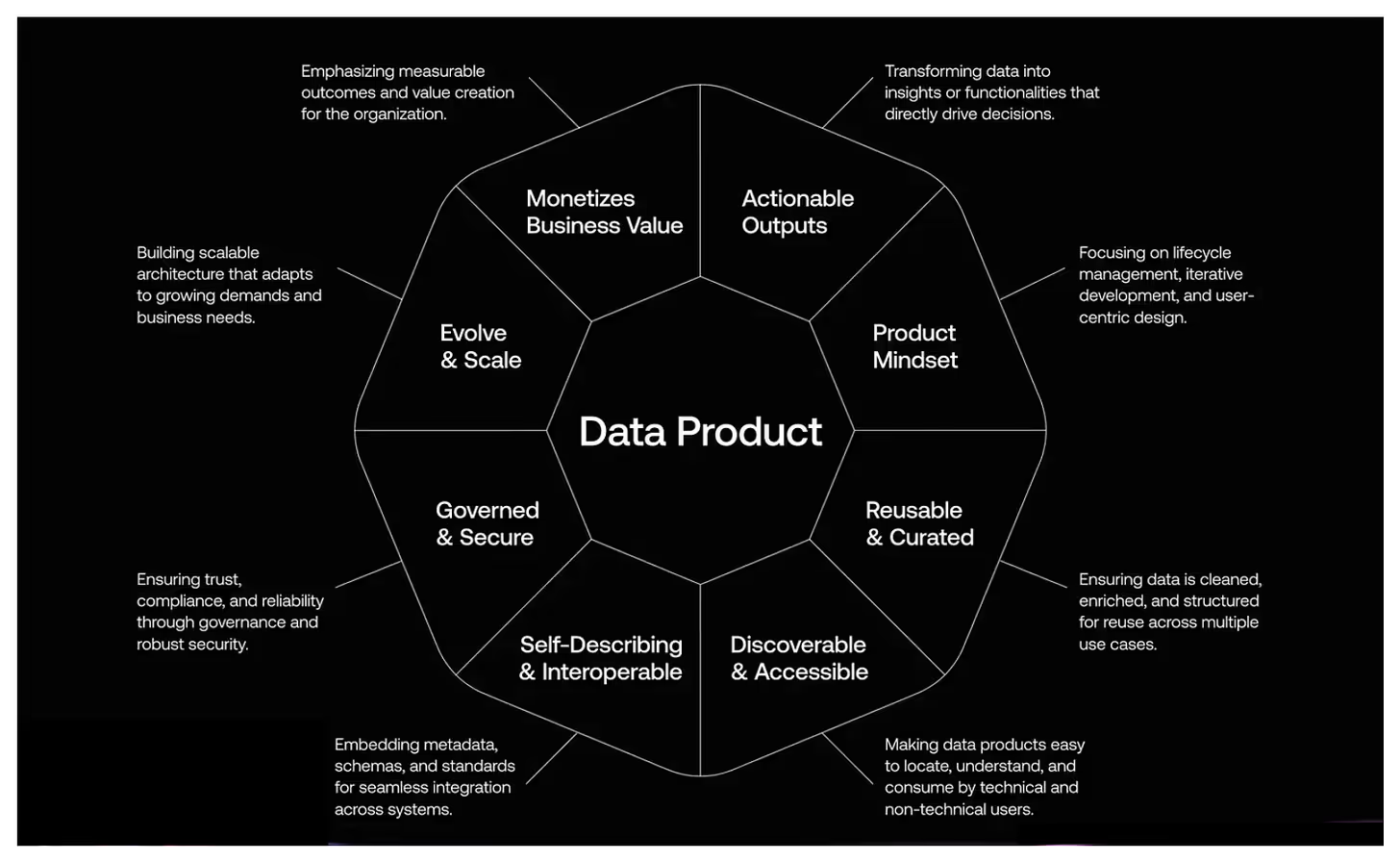
Data Product Owners do not operate in isolation, and their impact depends on tight, bi-directional collaboration across key roles within the data ecosystem. Here’s how it plays out:
They set the strategic direction and governance principles for their domain. A DPO turns that direction into actionable, user-centric data products and loops back practical feedback from business users to refine strategy.
These folks ensure semantic consistency and data accuracy. A DPO embeds these standards into the product and shares insights from real-world usage, where things work and where they hit friction.
They are guardians of data quality and compliance. The DPO taps into their expertise to improve the product while providing clear context and prioritization so stewards know where to focus their efforts.
They build the technical foundation. Guided by the DPO’s business-aligned requirements, they also advise on feasibility, scalability, and trade-offs, shaping a roadmap that has balances the tradeoff between ambitious and realistic.
They are the boots on the ground for daily support and product upkeep. Their front-line insights feed directly into the DPO’s backlog, helping prioritize enhancements that improve user experience and performance.
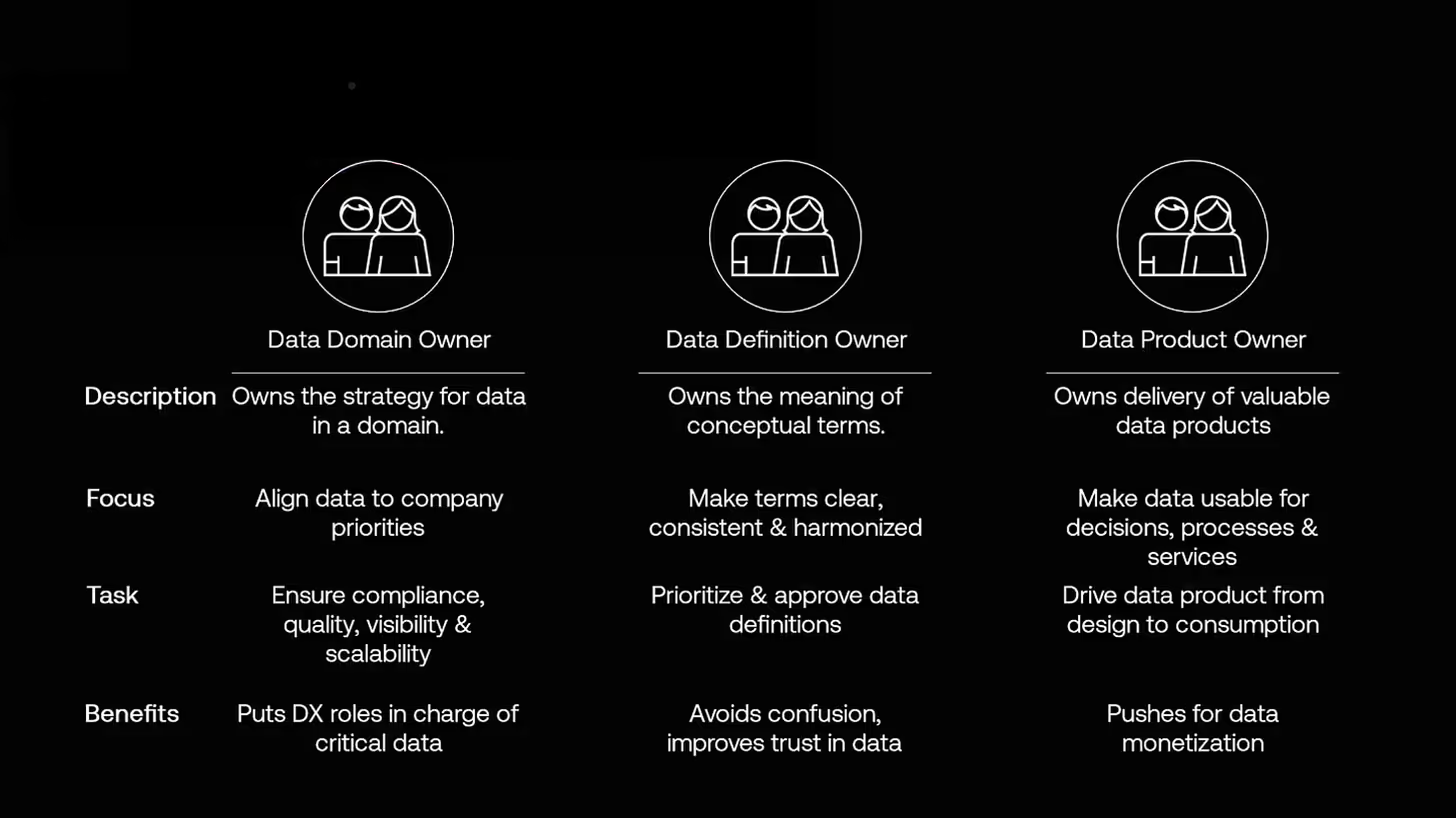
📝 Related Reads
How to Turn Your Data Team Into Governance Heroes🦸🏻| Tiankai Feng
A modern DPO needs more than just data fluency, they operate at the intersection of business strategy, product thinking, and technical execution. Here’s what sets a strong DPO apart:
A solid grasp of Agile and Scrum isn’t optional, it’s foundational. A DPO needs to own the backlog, prioritize ruthlessly, and deliver iteratively, keeping the product moving and the business aligned.
While they’re not expected to write code, a DPO must be conversant in data analytics, pipelines, architecture, and infrastructure. That fluency builds trust with engineering teams and ensures business needs translate into feasible tech outcomes.
DPOs connect the dots. They translate messy business problems into structured, insight-driven solutions, always tying product decisions back to the bigger picture and organizational priorities.
A strong DPO understands the levers of growth, cost, and efficiency. They focus on initiatives that visibly move the needle from a business perspective. This may include initiatives that support revenue goals, operational improvement, or customer value.
DPOs act as translators and bridge-builders. They align stakeholders, set a clear data product vision, and manage expectations, while keeping communication continuous and collaborative.
To be effective, a DPO must be more than skilled-they need to be empowered. That means senior leadership backing, a clear mandate, and the authority to make product calls that shape data strategy and unlock real business outcomes.
Related Reads 📝
The Skill-Set to Master Your Data PM Role | A Practicing Data PM's Guide
Why invest in a Data Product Owner? Because without one, your data remains an underutilized asset. With a DPO, it becomes a purpose-driven engine for growth, insight, and competitive edge.
Organizations spend millions on data infrastructure, but struggle to tie that investment to real results. A DPO brings focus. Like a product manager for data, they ensure every initiative is tied to tangible business outcomes: higher revenue, smarter operations, faster decisions. No more vanity dashboards, just value.
DPOs move fast. Using agile methods, they prototype, test, and refine data products at pace, getting value into users’ hands in weeks, not quarters. That speed keeps you ahead of shifting markets, ready to act on real-time insights instead of yesterday’s assumptions.
Data trapped in silos is data wasted. A DPO breaks those walls down, embedding in business units, translating between tech and commercial teams, and aligning everyone around shared goals. The result? Data that’s not just available, but actually used across the enterprise.
Great DPOs are doing more than product delivery. They're there to also ensure a product mindset across the data organisation. They champion documentation, training, and clarity. Every well-executed data product becomes a proof point, turning sceptics into believers and pushing the organisation up the data maturity curve.
Data on its own isn’t a differentiator, but actionable data is. A DPO acts as your internal data refinery, transforming raw information into insight-driven tools that sharpen decision-making, streamline operations, and improve customer outcomes. Treating internal data products with the same discipline as customer-facing ones sets leading organizations apart.
In summary, appointing a Data Product Owner is not only an apparent advantage, but a strategic step to develop sustainable success in any environment where business meets data.
The Data Product Owner (DPO) is the linchpin that turns raw data into real business value. They bring product thinking to the data space by being user-focused, outcome-driven, and constantly iterating for impact.
This role ensures “data as a product” isn’t just a catchphrase, but a disciplined practice. A true data product isn’t just shareable - it’s usable, trusted, and delivers measurable value. That’s what a DPO is accountable for.
More and more organizations are shifting the question from “Are we managing our data?” to “Are we productizing it?” And that’s the right move. Because without a DPO, data stays underutilized. With one, it becomes a competitive advantage.
A skilled DPO drives alignment, action, and adoption by:
Without a DPO, organizations risk underutilized data and missed opportunities. With a skilled DPO, your organization transforms data into strategic value, actionable insights, and sustained competitive advantage.
If your organization is serious about being data-driven, don’t just hire more analysts. Appoint a Data Product Owner. It could be the smartest data investment you make.
Thanks for reading Modern Data 101! Subscribe for free to receive new posts and support our work.
If you have any queries about the piece, feel free to connect with the author(s). Or feel free to connect with the MD101 team directly at community@moderndata101.com 🧡
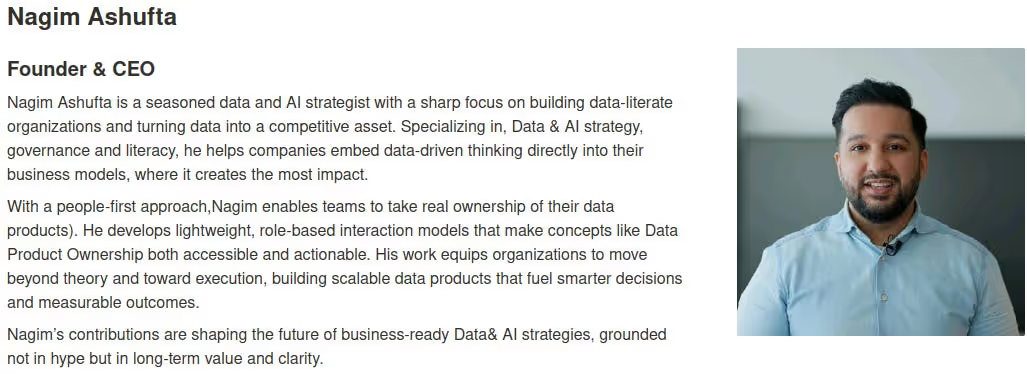
⭐️ More from the community
The Modern Data Survey Report is dropping soon; join the waitlist here.
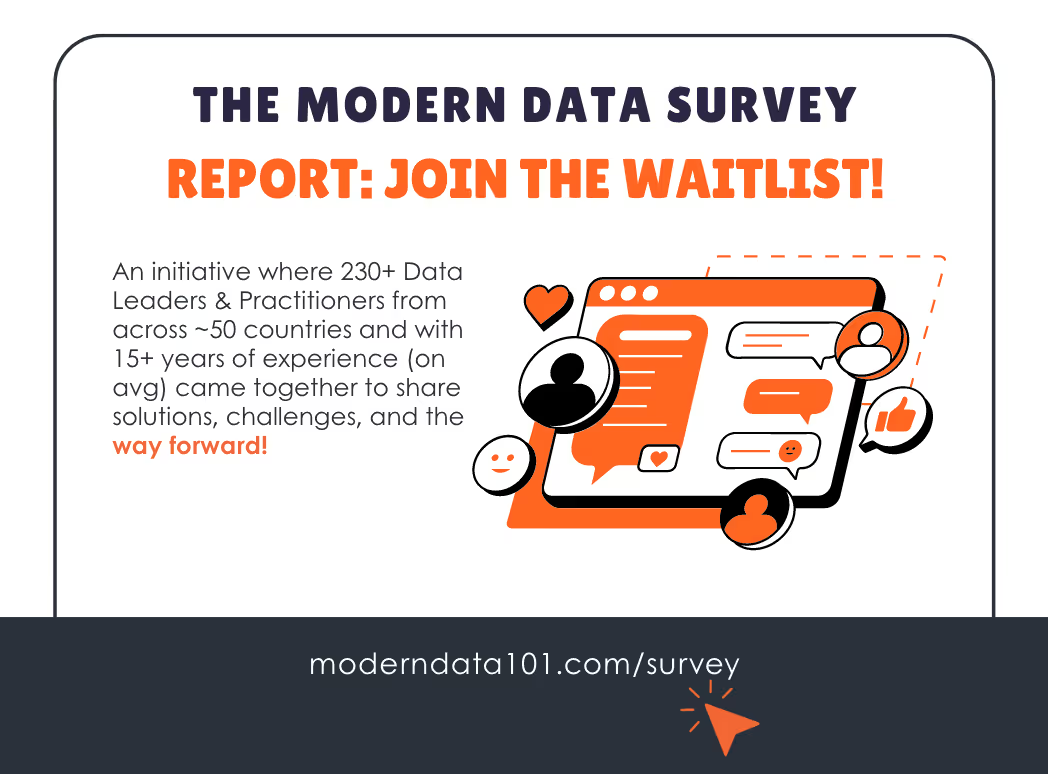
Thanks for reading Modern Data 101! Subscribe for free to receive new posts and support my work.
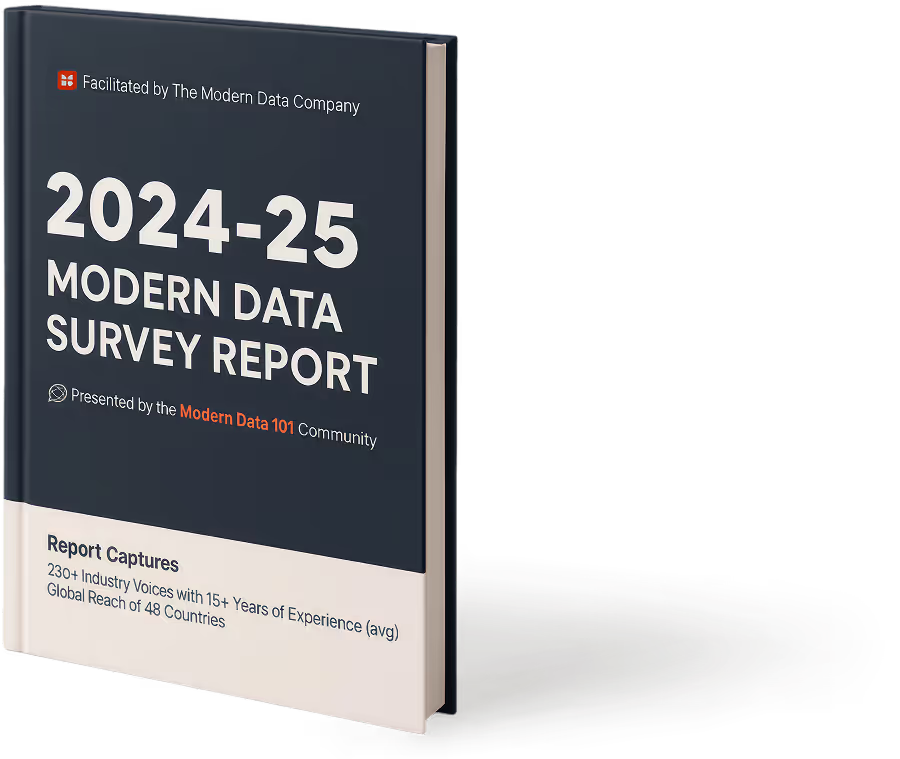
.avif)



Nagim is passionate about leveraging data-driven products and AI to drive business innovation and transformation, with expertise in data strategy, business insights, and implementing AI solutions for growth.
Nagim is passionate about leveraging data-driven products and AI to drive business innovation and transformation, with expertise in data strategy, business insights, and implementing AI solutions for growth.

Find more community resources

Find all things data products, be it strategy, implementation, or a directory of top data product experts & their insights to learn from.
Connect with the minds shaping the future of data. Modern Data 101 is your gateway to share ideas and build relationships that drive innovation.
Showcase your expertise and stand out in a community of like-minded professionals. Share your journey, insights, and solutions with peers and industry leaders.
